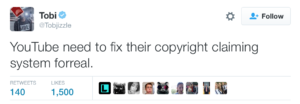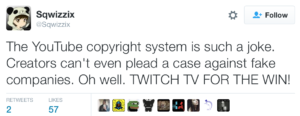One of the many advantages of our century is the opportunity to share original content meanwhile making a living. When Youtube stepped on the web, personal blogs and websites were still the money makers for social media enthusiasts. Nevertheless, only in a few years, Youtube took over and now is the top most profitable social networking site after Facebook.
YouTube is a global video-sharing website available all over the world which was established in 2005. The aim of the website is to share original content and discover others original work. Because Google bought Youtube in 2006 for 1.65 billion, setting up a Youtube channel will take you only a few minutes, if you have a Gmail account. With more access to the website, people encounter more and more copyright issues. If you create unique content, you are protected by copyright ©. If someone steals your video and uploads it under their name, then they are in BIG trouble. But before that, let’s go through some basics of Copyright Law in the United States.
The Copyright Law of the US is based on the “The Copyright Act of 1976″. It has been amended several times since then. The purpose of the Copyright Law is to prohibit others from claiming your intellectual “property”. This includes Literary works, musical works (including lyrics), dramatic works (including accompanying music), pantomimes and choreographic works, pictorial, graphic, sculptural works, motion pictures and other audiovisual works, sound recordings, architectural works. Nevertheless, there is a fine line between stealing and fair use. It’s ok to copy the ideas contained in a work. For example, a description of a product is not protected by the Copyright Act, but the product is. If one is criticizing the work, commenting, reporting on it, uses it for research, teaches about it in the classroom, they are not subject to Copyright Law. Nevertheless, if the copyrighted work has been used for commercial purposes seeking profit, the parties involved in the unlawful act are a subject to the Copyright Law. If you are going to create a sequel a translation, an adaptation or something of that sort, you must ask for the owner’s permission and only then you can use the work for your purposes. More information on copyright law can be found here.
Youtube has set up a few steps for you to follow, in case you find yourself in the middle of a copyright dispute. To take down a video that belongs to you, you should submit a Copyright Infringement Notification. It is important to know that when you submit a Copyright Infringement Notification, you are getting involved in a legal process. If they get a counter notification with proper evidence against your claim Youtube will send you an email notifying that the video might come back, unless you file a court action against the user and provide evidence of your ownership within 10 days. Check out this list of useful links on international intellectual property and copyright, in case you want to find out about copyright laws around the world.
Users have been complaining about the Youtube Copyright policy … for a while now.
 Taylor Swift, U2, Kings of Leon and Paul McCartney are among them. “We ask you to enact sensible reform that balances the interests of creators with the interests of the companies who exploit music for their financial enrichment. It’s only then that consumers will truly benefit” the artist’s stated in an open letter to Congress. Youtube has responded against the claim In a statement, saying that they have paid more than $3 billion to the music industry and the “voices of the artists are being heard”. Nevertheless, “The overwhelming majority of labels and publishers have licensing agreements in place with YouTube to leave fan videos up on the platform and earn revenue from them. Today the revenue from fan-uploaded content accounts for roughly 50% of the music industry’s YouTube revenue. Any assertion that this content is largely unlicensed is false.”
Taylor Swift, U2, Kings of Leon and Paul McCartney are among them. “We ask you to enact sensible reform that balances the interests of creators with the interests of the companies who exploit music for their financial enrichment. It’s only then that consumers will truly benefit” the artist’s stated in an open letter to Congress. Youtube has responded against the claim In a statement, saying that they have paid more than $3 billion to the music industry and the “voices of the artists are being heard”. Nevertheless, “The overwhelming majority of labels and publishers have licensing agreements in place with YouTube to leave fan videos up on the platform and earn revenue from them. Today the revenue from fan-uploaded content accounts for roughly 50% of the music industry’s YouTube revenue. Any assertion that this content is largely unlicensed is false.”
 In the case of Taylor Swift and others, Youtube isn’t the sole tool for profit. As opposed to multiple bloggers and video editors who earn their money through Youtube. For example Lewis Bond, who is a 22-year-old blogger. As he told on his Youtube Channel, he is being sued for Youtube copyright infringement. “Stanley Kubrick - The Cinematic Experience” has become the object of the dispute. It is an analysis and a representation of Kubrick and his art. The plaintiffs demand up to $150.000. Youtubers say that such claims, which blame them for infringement violate Youtube’s policy of fair use because they are in fact celebrating their favorite works of art and cinematography. There are hundreds of channels that upload movie commentary or analysis every day. Hence, only recently Youtube users have set up a legal defense club for YouTubers who have been hit by similar claims. According to Youtube’s FAQ page “In the United States, fair use is determined by a judge, who analyzes a specific case based on a set of principles. Different countries have different rules about when it’s okay to use material without the copyright owner’s permission. For example, in the United States, works of commentary, criticism, research, teaching, or news reporting might be considered fair use. Some other countries have a similar idea called fair dealing that may work differently.”
In the case of Taylor Swift and others, Youtube isn’t the sole tool for profit. As opposed to multiple bloggers and video editors who earn their money through Youtube. For example Lewis Bond, who is a 22-year-old blogger. As he told on his Youtube Channel, he is being sued for Youtube copyright infringement. “Stanley Kubrick - The Cinematic Experience” has become the object of the dispute. It is an analysis and a representation of Kubrick and his art. The plaintiffs demand up to $150.000. Youtubers say that such claims, which blame them for infringement violate Youtube’s policy of fair use because they are in fact celebrating their favorite works of art and cinematography. There are hundreds of channels that upload movie commentary or analysis every day. Hence, only recently Youtube users have set up a legal defense club for YouTubers who have been hit by similar claims. According to Youtube’s FAQ page “In the United States, fair use is determined by a judge, who analyzes a specific case based on a set of principles. Different countries have different rules about when it’s okay to use material without the copyright owner’s permission. For example, in the United States, works of commentary, criticism, research, teaching, or news reporting might be considered fair use. Some other countries have a similar idea called fair dealing that may work differently.”
Try using others work only when it is creative commons. Which means that the owner allows for anybody to use their intellectual property. If you do end up using somebody else’s work on your channel, just give them credit, with appropriate links and information. Also, make sure to mention somewhere on the final product that there was no copyright infringement intended. Know your rights and contact a lawyer, if you ever find yourself in a situation which involves fair use violation or copyright infringement. The law makes sure that nobody profits from your intellectual property, but at the same time it grants freedom for others to appreciate your work or on the contrary, criticize it. Consumer Law Magazine is aimed to raise awareness among consumers and help you through the legal process. Stay tuned for more information and follow us on Twitter, Facebook, and Instagram.




